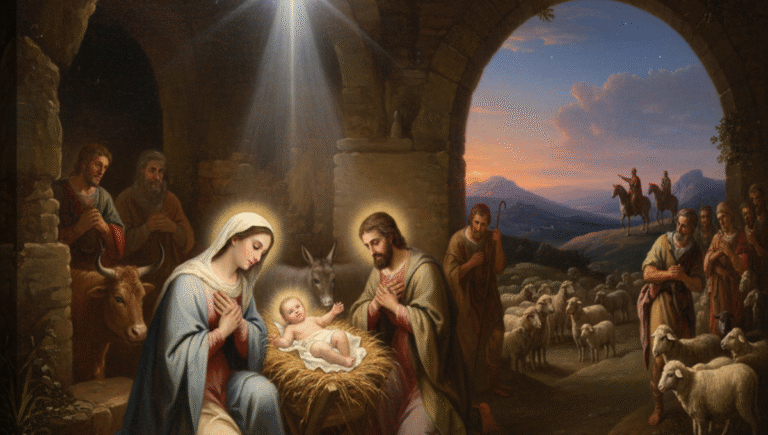The birth of Jesus Christ is one of the most significant events in human history, shaping faith, culture, and traditions across the globe. Every year, millions celebrate Christmas on December 25th, marking the birth of Christ. Yet, historians and biblical scholars have long debated whether this date is accurate. So, when was Jesus really born?
This question blends faith, history, astronomy, and ancient traditions. While the Bible offers important clues, it does not provide a direct date. Over time, researchers have pieced together evidence to narrow down possible years and seasons.
The Biblical Accounts of Jesus’ Birth
Two books of the New Testament—Matthew and Luke—provide narratives of Jesus’ birth, but they differ in details:
-
Matthew’s Gospel mentions Jesus being born during the reign of King Herod the Great. It includes the story of the Magi (wise men) who followed a star to find the newborn child.
-
Luke’s Gospel describes shepherds in the fields at night when an angel announced Christ’s birth, and it references a Roman census under Caesar Augustus and Quirinius, the governor of Syria.
Together, these accounts provide historical context but no exact date.
Was Jesus Born in December?
The most common tradition places Jesus’ birth on December 25th, but this was not universally accepted in early Christianity. The date was officially recognized centuries after Christ’s time.
Why December 25th?
Historians suggest a few reasons:
-
Roman Festival Influence: December 25th coincided with the pagan celebration of Saturnalia and Sol Invictus (the Unconquered Sun). Early Christians may have chosen this date to give new meaning to existing festivities.
-
Symbolic Theology: Some Church fathers believed Christ, the “Light of the World,” was fittingly born during the darkest time of year—the winter solstice.
-
Early Church Tradition: By the 4th century, the Roman Church officially adopted December 25 as the date for Christmas, spreading the practice widely.
However, biblical and historical evidence suggests Jesus may have been born at a different time.
Historical Clues About Jesus’ Birth
1. The Reign of King Herod
Matthew’s Gospel states Jesus was born while Herod the Great ruled Judea. Historical records show Herod died in 4 BC. That means Jesus must have been born before this date, likely between 6–4 BC.
2. The Census of Quirinius
Luke mentions a census when Quirinius governed Syria. This census is historically recorded around 6 AD, which seems too late. Some scholars argue Luke may have referred to an earlier local census or overlapping administration, placing the birth closer to 6–4 BC.
3. Astronomical Events – The Star of Bethlehem
Some researchers connect the Star of Bethlehem to actual celestial events:
-
A triple conjunction of Jupiter and Saturn in 7 BC, seen as an astrological sign of a royal birth.
-
A comet or supernova observed in 5–4 BC, mentioned in Chinese records.
If the Magi were following such a sign, Jesus’ birth could have occurred in this timeframe.

Was Jesus Born in Spring or Fall?
The Gospel of Luke mentions shepherds watching their flocks at night (Luke 2:8). This detail provides seasonal clues:
-
In December, the weather around Bethlehem can be cold and rainy, making it less likely shepherds would keep sheep outside overnight.
-
Spring (March–April) or early fall (September–October) would have been more natural times for shepherds to be in the fields.
Many scholars therefore suggest Jesus was more likely born in spring or autumn, not in the middle of winter.
Theories About the Exact Year
Scholars generally place Jesus’ birth between 7 BC and 4 BC, based on Herod’s death and astronomical events.
-
7–6 BC: Some suggest this date due to Jupiter-Saturn conjunctions.
-
5–4 BC: Others propose this range, supported by comet sightings and Herod’s timeline.
-
1 AD or later: Less likely, since Herod’s death predates these years.
Thus, the best estimate is that Jesus was born sometime between 6 and 4 BC, not in the year “0” as commonly imagined.
Why Does the Exact Date Matter?
For many Christians, the exact birth date of Jesus is less important than the spiritual meaning of His coming. The celebration of Christmas symbolizes:
-
Hope: Light entering a dark world.
-
Fulfillment: Prophecies from the Old Testament coming true.
-
Faith & Unity: A shared moment of reflection and worship.
From a historical perspective, however, knowing the time of His birth helps anchor biblical events in world history, connecting scripture to the broader Roman and Jewish context.
Conclusion: When Was Jesus Really Born?
Based on historical, biblical, and astronomical evidence, Jesus was most likely born between 6–4 BC, probably in spring or autumn, rather than December 25th. The traditional Christmas date developed later, influenced by both theology and Roman customs.
Yet the message of Jesus’ birth transcends dates and calendars. Whether celebrated in December or understood historically in another season, His birth remains one of the most impactful events in history—marking the beginning of a story that continues to shape faith, culture, and humanity itself.
